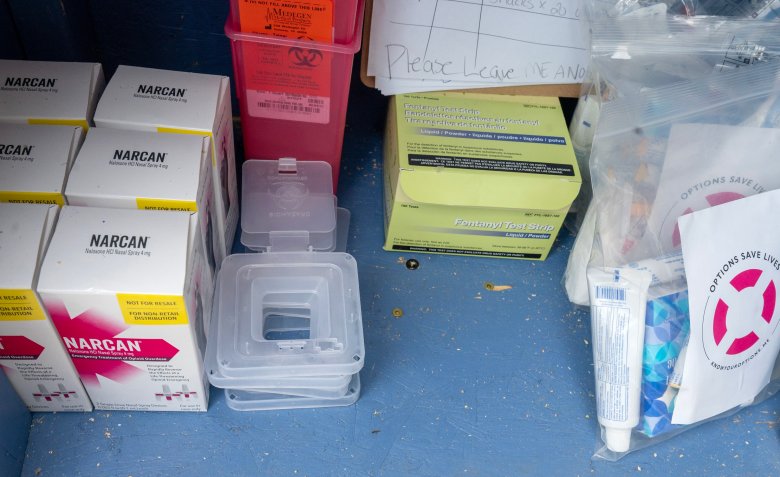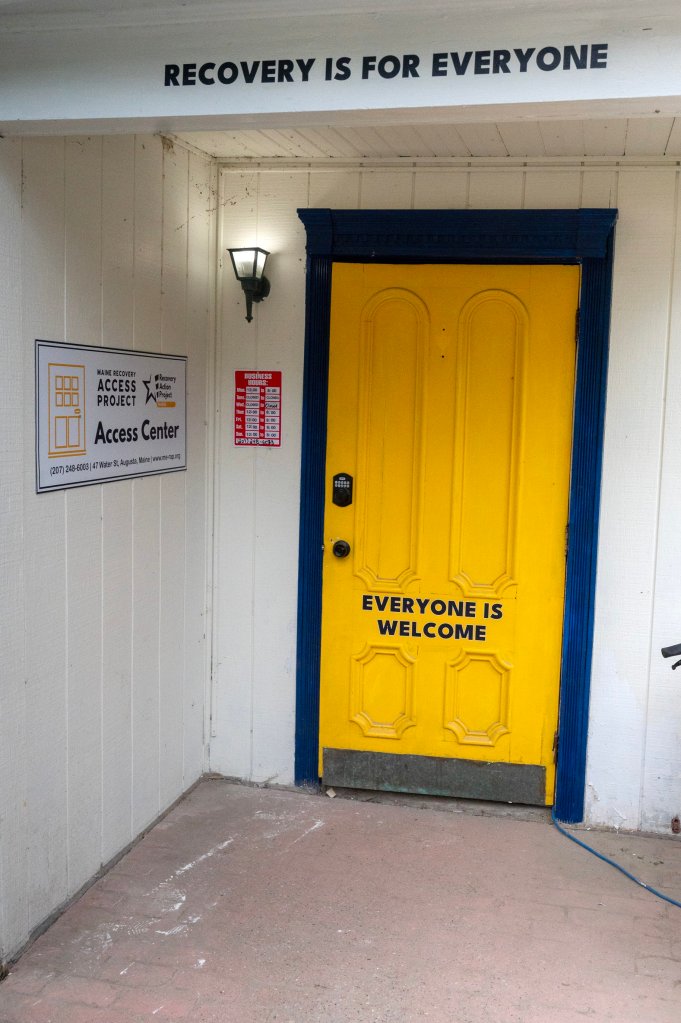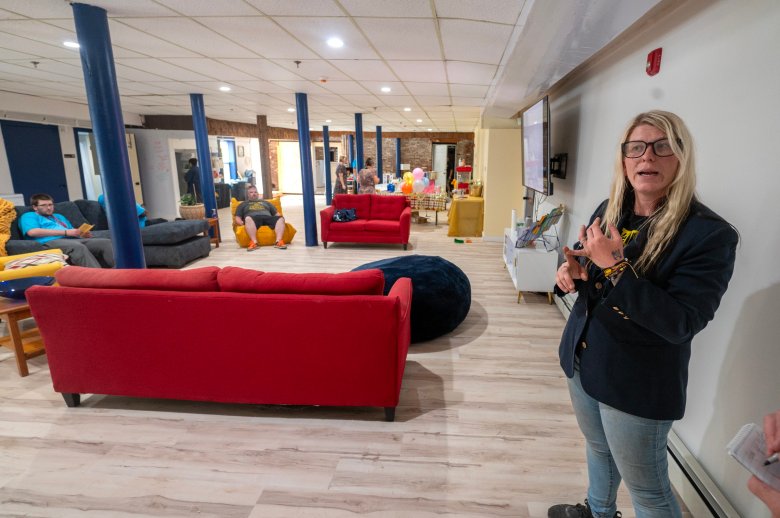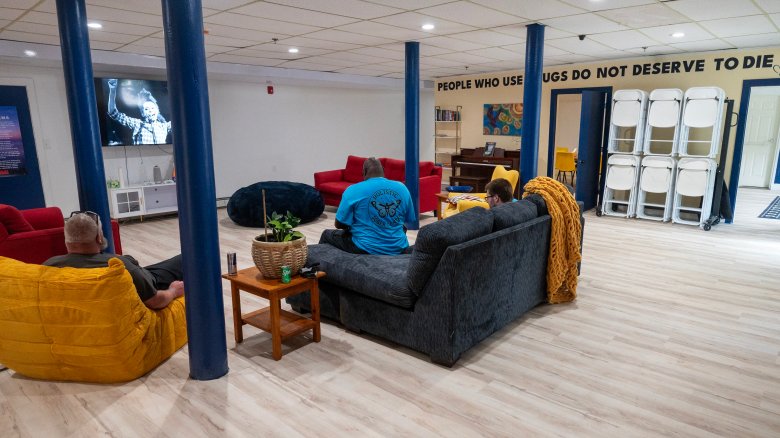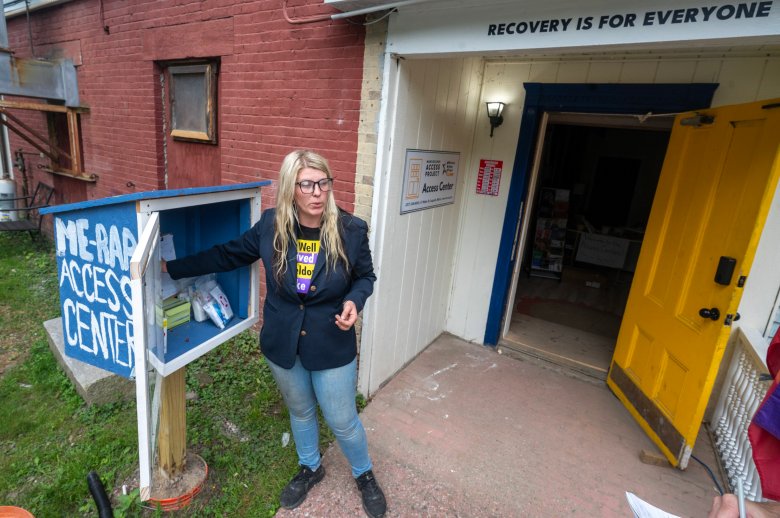
AUGUSTA — “People who use drugs do not deserve to die,” is emblazoned, in large, block letters, across the length of an entire wall of the newly opened Access Center.
Those words, attributed to late Maine drug recovery advocate and activist Jesse Harvey, are foundational to the work advocates hope to do at the center, located in the rear basement level of the Edwards Inn.
Courtney Gary-Allen, executive director of the Maine Recovery Access Project, the entity that created the Access Center, said it already had welcomed seven people just minutes after it officially opened its doors at noon Thursday.
At the center, people in recovery from substance use disorder, as well as those still using drugs, can be connected to services. They also can attend recovery meetings and get coaching, find help with basic necessities including housing and storing their possessions and shower. They can pick up supplies meant to help keep them safer or revive them from an overdose, and build connections with people who’ve been through some of the same things they’ve experienced.
While organizers aren’t yet sure how many people will use the center, Gary-Allen said it could hold about 30 people at a time. She said a goal of the organization is to help at least 50 different individuals a year, a number she anticipates they will surpass in much less time.
For now it will be open noon-8 p.m. Thursday to Monday. Gary-Allen said it would be open more if not for a lack of funding for staffing.
The Access Center was granted nearly $500,000 from the Maine Recovery Council. Gary-Allen said that should be enough to sustain it for at least two years.
Chasity Tuell, new executive director of the Maine Recovery Council, the entity responsible for allocating half of Maine’s share of opioid settlement funds, said the council is proud to be funding the center. She noted the center’s staff are people who have life experiences with drug use and recovery, either themselves or their families, giving them compassion and understanding to share with those who seek help there.
“This isn’t just a building, it’s a lifeline, a place where people who use drugs can walk through the doors and be met with dignity and compassion,” she said. “Too often people who use drugs are pushed to the margins, treated as problems to be solved instead of people to support. But here, in this space, the opposite is true.”

The staff and volunteers are able to refer people to medical, mental health and substance-use treatment, although as a peer support organization, it does not directly provide treatment. It provides a safe place where people can come to be with their peers.
It’ll also have youth substance prevention programming, a climate-controlled space where people can just hang out during the day, and access to the overdose-reversing drug naloxone as well as other harm-reduction options meant to help people still using drugs reduce the chances of dying from an overdose.
And it has computers visitors can use.
Just outside the center’s door sits a cabinet, which Gary-Allen said was built by members of a youth substance use prevention group. It is accessible around the clock daily and will contain free items such as naloxone, plastic containers people can use to dispose of used needles that can be safely deposited in a sealed container .
Gary-Allen said if people see improperly disposed of needles in Augusta, they can call the center, at 207-248-6033, which will send someone to collect and dispose of them.
The center also has a syringe exchange program, in which people can exchange a used needle for a clean one.

If people see upsetting behavior by someone that may be on drugs in the city,they can call the center, which will send someone to check on the person, and see if they want to come to the center instead of remaining on the street. Downtown merchants have expressed concerns about people who are homeless or using drugs being a nuisance downtown. She said the center’s location at 53 Water St. is ideal as it’s in the north end of the city’s downtown, away from most businesses but close enough that people who might otherwise hang out in the neighborhood on the street can go there, instead.
“There couldn’t be a better location; this is where we need to be,” Gary-Allen said.
When it’s open, the center will be staffed by at least two workers, not including Gary-Allen whose office is there, and volunteers, for which Gary-Allen said there is a great need.
While the center is not specifically meant to provide services to homeless people, it will do so, as some people who are homeless are also drug users.
The center’s services will augment what’s being offered at the new United Community Living Center, which provides an array of services including free medical care to homeless people at 12 Spruce St., near the Ballard Center on the east side of the Kennebec River.
Neither of those two daytime service centers provide overnight shelter for homeless people, which Gary-Allen said remains a need in the area. The Augusta Overnight Emergency Warming Center is open only during the winter.
Ryan Hampton, founder and executive director of Mobilize Recovery, said at a grand opening ceremony for the Access Center Wednesday it’s appropriate that the words of his friend Harvey are etched so prominently on the wall there, where all who enter will see his quote. Mobilize Recovery is an organization whose focus is raising up the voices of those affected by addiction.
“It’s not just a slogan it’s really a fundamental truth, a guiding principle,” Hampton said to the roughly 75 people at the opening. “It’s a promise that fuels our work and fuels our advocacy. Jesse’s work … is the very foundation we’re building on today. And this center is a living legacy. The Access Center is definitely going to save a lot of lives, by connecting folks to care, and that’s essential. But the mission, I believe, goes even further. It’s a launchpad, a place where people who have been silenced will find their voice. And this center is a part of that solution. It’s a testament to our resilience, a promise to every person still struggling that they are not alone and they are worthy of recovery on their own terms.”

